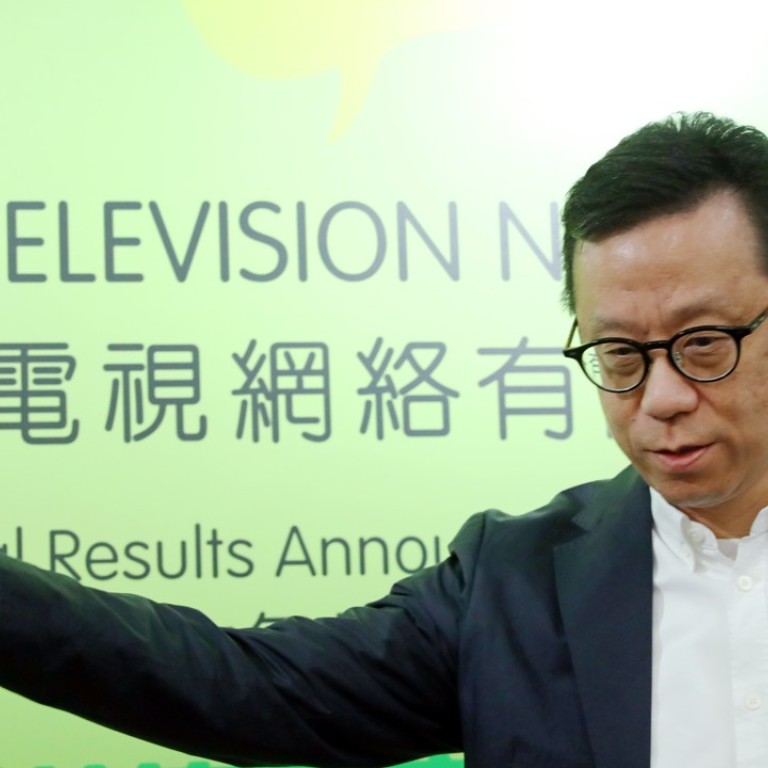
Hong Kong media maverick Ricky Wong quits free-to-air TV dream and exits sector
Tycoon says he has waited eight years for licence grant from government, as company HKTV announces HK$204.9 million in losses
Media tycoon Ricky Wong Wai-kay has quit his troubled quest to secure a free-to-air television licence for the ill-fated Hong Kong Television and vowed never to return to the broadcasting business.
His remarks came on Tuesday as the publicly listed HKTV announced its annual results for 2017, revealing a staggering net loss of HK$204.9 million (US$26.1 million). The share price of HKTV had plunged by 14 per cent to HK$3.16 when markets closed on Tuesday.
Explaining the reason to end his lifelong free-to-air TV dream, Wong, who chairs HKTV, said the wait had simply been too long.
Hong Kong media mogul Ricky Wong may give up on free-to-air TV dream
“The answer is as simple as ‘we’ve been waiting for eight years,’” he said.
According to the outspoken businessman, the company, formerly named City Telecom, was “invited” by government officials in 2009 to apply for the licence.
The rejection of HKTV’s application sparked public outcry that year, with many questioning whether the decision was politically driven. More than 300 staff members were also laid off in the same year.
The company’s second bid was filed the following year, but on Tuesday Wong said the application had been withdrawn after four years without a reply from the government.
Despite declaring his exit from the broadcasting business, Wong said he had no plans to rename the company. “I think the name … HKTV is a sweet memory for many Hong Kong people – the memory, I think, is valuable.”
I taught my kids that this world is never fair, we have to learn to face unfair challenges
Asked if he held any resentment towards the government, Wong said he would “take it easy”.
“I taught my kids that this world is never fair, we have to learn to face unfair challenges,” he said.
Wong also told reporters he had “nothing to say” to Leung, now vice-chairman of the Chinese People’s Political Consultative Conference, the country’s top advisory body.
While the company currently operates a broadcast-type mobile TV service via its website and mobile application, Wong also announced on Tuesday it would be shut down.
The TV shows produced by HKTV would be aired on a free TV channel in April, he said. According to sources, the programmes will be aired on Fantastic TV starting mid-April.
Wong said the company would focus resources on the e-commerce business, such as purchasing more trucks to deliver goods sold via its online shopping platform, HKTVmall. Media equipment that was bought for its TV productions would be used to create multimedia content to support the e-commerce push.
A spokesman of the Office of the Communications Authority said on Tuesday night that HKTV had informed the regulator earlier in the day about its decision.
“After HKTV withdrew its application, the office has no other free-to-air TV licence application to process,” the spokesman said. He did not say why the application took years to process.
Victory for Hong Kong media maverick Ricky Wong in mobile TV battle
A former HKTV staff member said she was not surprised by Wong’s move as the company had already laid off all production team members and had since focused on its online shopping business. In 2016, HKTV posted a net loss of HK$257.1 million.
Norris Wong, a former junior scriptwriter who was laid off in 2013, said Ricky Wong should be remembered as someone who revolutionised the development of local broadcasting.
“Never before had any broadcaster invested so much money into local dramas,” Norris Wong said. “By doing so, he prompted other broadcasters such as TVB to do better to compete, raising the standard of local dramas. We also saw hope that the reputation of Hong Kong productions would be revived and the industry can regain its fame in the region.”
She said HKTV was once a place where local scriptwriters could be creative and make their dreams of good productions come true, adding she was saddened that all this had ended.
Information technology sector lawmaker Charles Mok said it was a shame that HKTV was never awarded the licence.
“We had no chance to know if the [free-to-air TV] market will be different,” Mok said.
The case of HKTV might have put off interested parties from entering the local TV industry, he said, adding that the government needed to introduce more transparency to its process of granting such licences.


